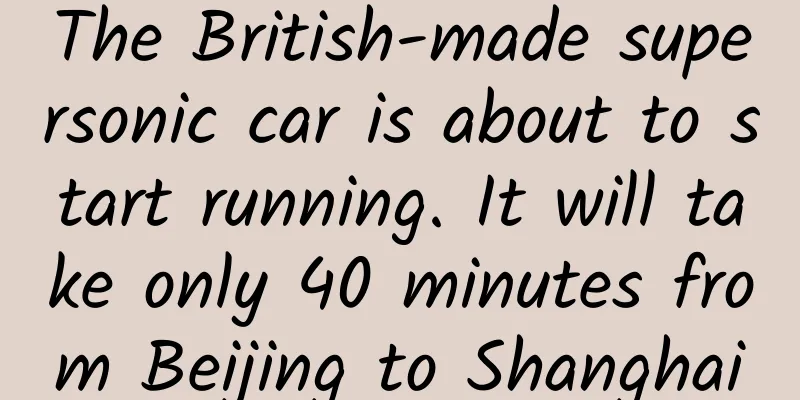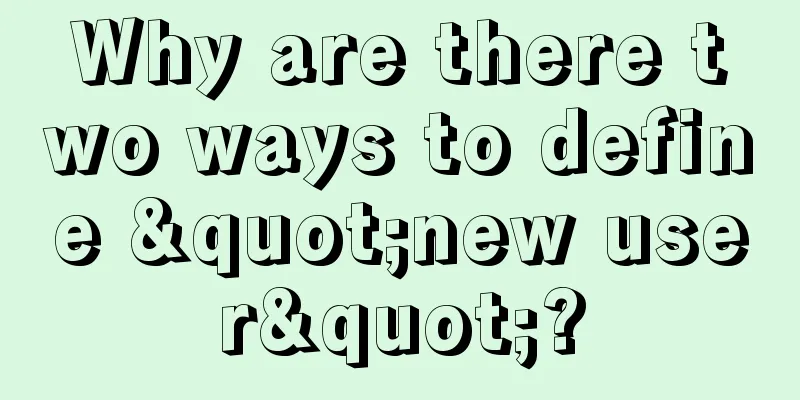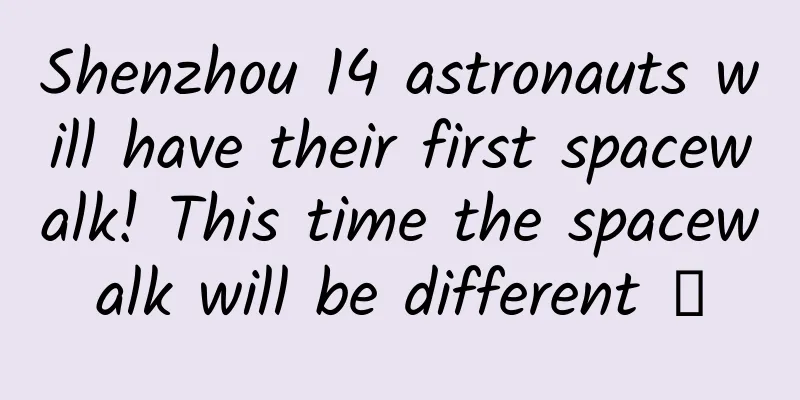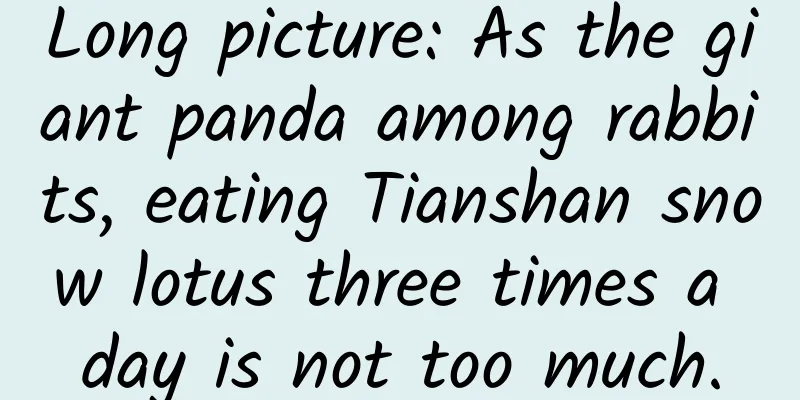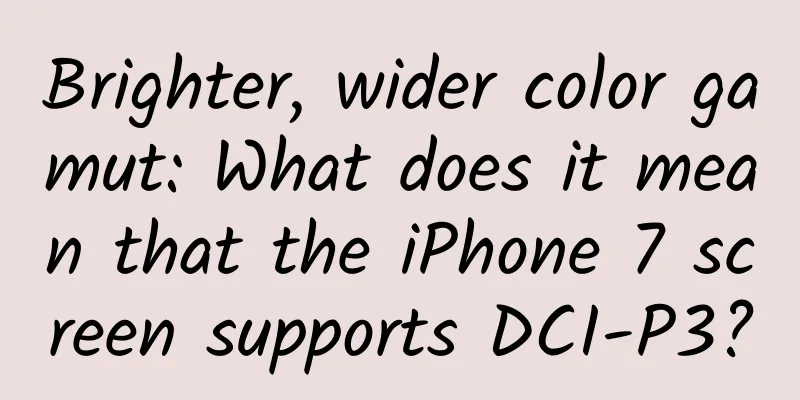Google, 360, Sogou, Baidu, which one is the favorite translation tool of new media editors?
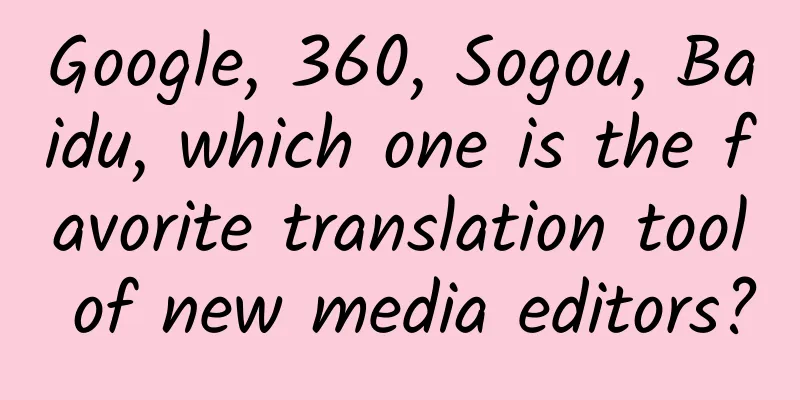
|
As a new media editor, the necessary skills include coding, photo editing, jokes, and so on. It can be said that I have a myriad of talents. However, I recently discovered that I still have a big shortcoming, which is English. After learning from my mistakes, I realized that it is impossible to quickly learn English to the level of a master, so I decided to choose a translation tool to help me overcome this obstacle on the road to writing. So I decided to compare the four translation tools: Google Translate, Baidu Translate, Sogou Translate, and 360 Translate. Let’s first take a look at the main interface of each company. As a person who loves appearance, I still attach great importance to the first impression. Sogou's page looks like this: I originally really like this green color, it is visually pleasing, but the weird push notification below is really annoying. The 360 translation page looks like this: It can be said to be very simple, so without further ado, let's start translating. For me, who doesn't like things to be too complicated, I prefer simple and clear ones, so I'll vote for it for now. Baidu's main page looks like this: It is also quite simple. The following push notifications are relatively practical articles, which are quite suitable for people who want to learn English. It feels pretty good! Google uses blue as its main color: Google's main interface can be described as simple and elegant. Judging from the interfaces of various companies, they are all very good. However, Sogou Translation is slightly inferior due to its messy push notifications. Sogou lost this time. However, the quality of a translation tool lies in the accuracy of the converted language. I write about all kinds of topics, so I decided to try different types of words. My major is computer science. How can I not show off this profound and mysterious major? So I picked a subject that once tortured me, "Microcomputer Principles and Interface Technology", to test it. Sogou's translation is as follows. It seems to be relatively correct, but it fails to pay attention to the capitalization of words. The content of 360 translation is the same as Sogou's, and details such as uppercase and lowercase are also taken into consideration. Baidu's translation is so random that it's unbearable to look at. Google "collides" with Sogou. Not only do the two companies have the same content, but they also have the same habit of not distinguishing between uppercase and lowercase letters. I think for this kind of academic term, accuracy of content is one aspect, but what is more important is to pay attention to writing habits. Details determine success or failure. In this round, Baidu was completely defeated and 360 Translation won. After talking about my major, let’s take a look at my favorite book, “Water Margin”. Sogou translates it as “Water margin”: Although there is a glossary, this translation is still far from satisfactory. Let's take a look at the 360 translation version: “All Men Are Brothers, a popular fiction by Shi Nai'an” means “All men are brothers throughout the world”, which is a quote from the translation of American writer Pearl S. Buck, rather than a direct translation based on the literal content. Let’s take a look at Baidu’s translation, which is the same as Sogou’s translation, but also has an additional dictionary definition. Google is the same as above, but it seems to be worse than Sogou and Baidu, and there is no explanation: Personally, I think that “All men in the world are brothers” captures the essence of “Water Margin”. I would definitely give my vote to 360 Translation. Sogou and Baidu are like students who don’t do their homework well. They know the answer but still write it carelessly. Google is the worst in this regard. We have mentioned the four great classics, and of course we cannot forget the well-known ancient poems. Let’s take a look at how different authors translate the line “Spring sleep does not feel the dawn” that we have memorized before we even go to school. Let’s take a look at Sogou translation first, “Spring naps, unconscious of the dawn.” I guessed it was roughly this idea, but I didn't fully express the meaning of the ancient poem. I can't get more than 70 points! The translation of 360 is: In spring, one sleeps and wakes up to find it is already day. The sentence structure and meaning of the poem are very close to the original poem, and the mood of a spring nap is expressed very well, so it can be scored 90 points. Next, let’s look at Baidu’s translation: “Spring sleepless.” “Spring sleepless”? Are you kidding me, and what the hell is that ad below? Google’s is even simpler, just one “sleepless” and it’s done. Well, it seems that I can't demand too much from various translation tools to translate ancient poetry perfectly. After all, it is not easy to translate it into vernacular. Sogou performed well this time, and 360 was even better. Because ancient poetry is too profound, I chose a down-to-earth Internet buzzword "求锤得锤", isn't it surprising? Let’s take a look at Sogou’s translation first: This translation is also very headache! 360 directly translates to "Hammer! Hammer!" Are you calling for a hammer? You're really not here to make fun of me! The same goes for Baidu. We can feel the call for Hammer through the screen. Finally, let’s look at Google. It’s the same as Sogou. Forget it, this wave of “asking for hammers” really gave me a bunch of hammers, and all four artifacts were destroyed. What a surprise. What a surprise. After comparing the main interface, professional terms, book titles, ancient poems and online terms, I feel that each has its own strengths. However, as far as the translation of some popular online terms commonly used in daily writing is concerned, I prefer 360 Translation. Which translation tool do you readers prefer? As a winner of Toutiao's Qingyun Plan and Baijiahao's Bai+ Plan, the 2019 Baidu Digital Author of the Year, the Baijiahao's Most Popular Author in the Technology Field, the 2019 Sogou Technology and Culture Author, and the 2021 Baijiahao Quarterly Influential Creator, he has won many awards, including the 2013 Sohu Best Industry Media Person, the 2015 China New Media Entrepreneurship Competition Beijing Third Place, the 2015 Guangmang Experience Award, the 2015 China New Media Entrepreneurship Competition Finals Third Place, and the 2018 Baidu Dynamic Annual Powerful Celebrity. |
>>: Xiaomi Mi 8 SE review: Perhaps the best value quasi-flagship
Recommend
The first revision of the Science and Technology Popularization Law has been completed. These highlights are worth paying attention to.
On December 25, the 13th session of the Standing ...
Remember these rules, and you can get users to voluntarily help you promote like a snowball without spending a penny.
In this era where mobile phone addiction is rampa...
How to remove the traffic limit of Douyin? What does TikTok traffic limit mean?
This article mainly introduces how to lift the fl...
Why did Volkswagen go against its "ancestral teachings" and accelerate the construction of Wolfsburg in Anhui as it steps on the accelerator again on the road to transformation?
Have you noticed this phenomenon? In the past era...
How can bidding projects obtain promotion information through multiple channels? (Part 2)
Continuing from the previous article "How to...
What are the charging standards of SEO service companies? How much do corporate website SEO optimization outsourcing companies charge?
There are three types of cooperation between ente...
How to apply for the 400 service phone number? How to apply for the 400 customer service phone number?
How to apply for a 400 service phone number? How ...
I also sleep ten hours a day, can I become a champion?
Author: Zhang Yilin Recently, the 18-year-old Gu ...
The "core" of the watermelon is definitely true love! Why is the middle of the watermelon the most delicious? |Expo Daily
Why is the middle of a watermelon the most delici...
For removing formaldehyde in decoration, green radish, activated carbon and grapefruit peel are not as good as it!
Many of my friends who bought new houses chose to...
Please be kind to your programmers, otherwise hum!
[[127840]] Yan, a programmer born in the 1990s, w...
China's Xiaomi surpasses Apple to become world's second largest smartphone market
Xiaomi now has a 17% share of global smartphone s...
A practical course on color business that goes beyond teaching matching
A practical course on color business that teaches ...
How did the ancients treat themselves to a "snack" 10,000 years ago? Roast a rabbit?
Audit expert: Cai Dawei Professor of the School o...
